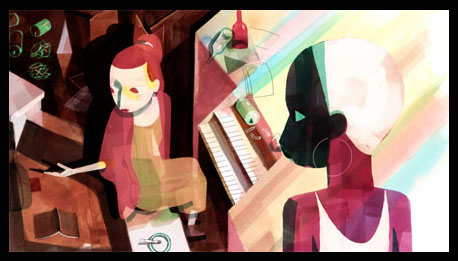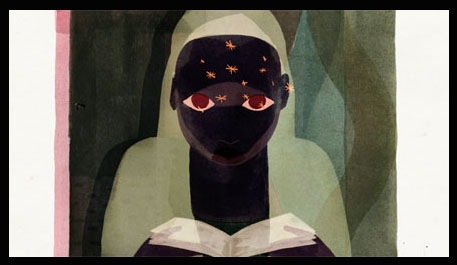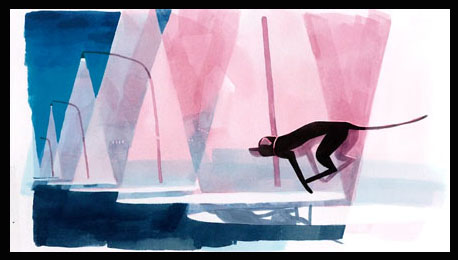
Academy members will vote for the nominees of the 93rd Oscars beginning next Friday March 5th. One of the 10 shorts vying for a spot in the Best Animated Short Film category is Genius Loci. The official synopsis: “One night, Reine, a young loner, sees among the urban chaos a moving oneness that seems alive, like some sort of guide.” Intriguing, right? Director Adrien Merigeau’s visions come alive in this excellent short. This Animation Scoop Email Q&A with Merigeau was edited for clarity.
Jackson Murphy: Where does the inspiration of the story come from?
Adrien Merigeau: The first ideas that became the base of my short film’s story came to me as I was sketching and documenting the lives of my friends back when I was living in Ireland, working on Tomm Moore’s film Song of the Sea, circa 2010. There was a group of poets and artists who lived in and out of an old water mill in the countryside. They were very open, very kind, and it felt to me as if they were living some kind of a spiritual life in an ascetic way. One of them in particular had a spirit in him for sure, and I thought to talk about the relationship between a poet and their spirit and the mystical place where ideas come from. Later when I moved to Paris, I started working in squatted buildings turned into artists residencies. Sometimes it felt like being in nature. We were living and working in abandoned buildings, sometimes camping in them using candlelight… hunter-gathering to collect clothing and food for the community. I loved the idea that parts of the city, especially run down parts, with big slabs of useless concrete (open spaces full of broken stuff), can feel like being in the forest. These two ideas were the inspiration of my short film’s storyline.

JM: So much of your film involves the movement of shapes. What fascinates you about shapes?
AM: It is more so the movement of things that fascinates me – the way things come to life when they are animated. And especially abstract animation because it doesn’t represent anything specific, so the viewer has a way of watching it that is very direct – there’s no interpretation, no meaning, just colors and movement. To me, this way of observing is akin to meditation, and the spirituality that comes with it was connected to what I wanted to talk about in my film. It can also be very pretty, I think, in a liberating way.
JM: How did you approach some of the more fast-paced, mind-bending sequences?
AM: I worked with two of my close animation filmmaker friends, Alan Holly and Vaiana Gauthier, for the more abstract sequences. With Alan Holly, we storyboarded his sequence together, and we both liked the way our sketches were superposing on the same paper page. We thought of keeping a multitude of drawings on top of each other on screen, so that the same action is seen from different angles in the same scene, like a full page of sketchbook but animated, to emphasize the moment when Reine is dissociating. Alan Holly and I have worked on experimental projects together, such as Jennifer Evans’s music video “Scattered”. I admire the way he times his animation as if it was a musical composition. It’s very dynamic and fluid.
The way Vaiana Gauthier and I worked on her sequence was that I made a storyboard where I drew the basic action (the pot of soup boiling over and spilling) and had some indications as to what would happen first. But then all the rest is Vaiana’s personal abstract work. It was really important for the film that we felt that Reine, the main character, was drifting very far in her attention, and forgetting where she was. Vaiana’s abstract flow of colored pencil and watercolor animation was amazing to give us the feeling of letting go of the tangible world and following a meditative flow and a sensorial experience, as Reine is pursuing in the film.

JM: You also highlight background noises (boiling pot, water, trains, papers fluttering). How difficult was it to get those sounds just right?
AM: I don’t personally know how difficult it was. I could just appreciate them when my father Lê Quan Ninh and his team, who did the sound and music design, worked on them. Ninh is a percussionist working on contemporary music, written and improvised music, and he has a lifelong development of his understanding of music, sounds, and how they are the same. It was particularly inspiring to work with Ninh because in animation all the sounds and music have to be recorded from scratch. There is no film shoot, and Ninh thinks about sounds and music as a unity, which makes his design for Genius Loci extremely coherent and essential. The train sounds can be heard as percussion, water thought as cello, and some musical parts can come from field recordings. It’s very interchangeable.
JM: One of the most interesting lines in Genius Loci is, “I find chaos. It’s always there. It just changes in scale.” How does this line speak to you? How are you able to control chaos in your life?
AM: Thank you so much. Maybe it comes from the idea that you can see beauty everywhere… if you remove the sense of meaning to the things around you and just observe or listen to them happening. For example, I was watching a bus that was stuck trying to do a U-turn in the middle of the road blocking all the traffic. The uproar of the beeping of cars and the overall agitation was gorgeous and musical and fascinating when I stopped thinking about how late I was going to be. The cracks of a broken coffee cup can be so pretty that the japanese art Kintsugi is dedicated to highlighting them with gold. An abandoned building can be very awe-inspiring as you watch its uselessness as a graphic, abstract landscape. I thought of the notion of chaos as empathy towards things that exist without meaning, like water spilling or a broken TV set. As far as control in my life, personally I am an anxious person and things tend to be pretty organized and orderly around me most of the time. Only when I feel relaxed and true to myself can I allow my surroundings to be chaotic, and I really do love it and I wish I could let go of control much more often.

JM: How has your work on Cartoon Saloon Oscar nominated animated features The Secret of Kells and Song of the Sea shaped you as a filmmaker?
AM: In so many ways! From a storytelling perspective, I’ve always admired Tomm Moore’s generosity towards his audience. He has a way of bringing to a modern age the ancient stories of the Irish culture that honors the storytellers’ traditions. His writing and crafting of strong lead characters is so high level and is paired with a genius way of graphically framing them in gorgeous, stylish compositions which remind me of Paul Klee’s and Gustav Klimt’s work. And they’re rooted in Jungian symbolism and archetypes. It’s stunning. I love how Tomm honors the history of 2D animation and brings it to the 21st Century, something that inspired the writing of my two short films. I’ve also learned so much about watercolors, texture and lighting from Ross Stewart, who was the art director of The Secret of Kells and who co-directed their latest effort Wolfwalkers.
JM: What’s been the most rewarding part of this process of making and releasing Genius Loci?
AM: It was really rewarding to find a way to work intuitively on some scenes when the film allowed sequences to be more abstract. I had a lot of fun working on images that were not important story points but which found their places in the film as a montage of thoughts and images. But probably most rewarding of all was the experience of film festivals and the strength and care of the short film community. Even though our films are not done for commercial reasons, there is still a massive network of support with massive audiences, screenings, events, and visibility, and I’m really extremely grateful for that. Unfortunately this experience was challenged as most festivals went online during the COVID pandemic. I appreciate their efforts to keep the events going online but it doesn’t nurture the same sense of accomplishment as attending them in person. I was lucky to attend three film festivals before the first lockdown, but my heart really goes out to the filmmakers trying to release their short films right now in the first quarter of 2021. I hope we can get together at screenings soon and celebrate them properly again.
JM: This is one of the 10 finalists for the Best Animated Short Film Academy Award. What would a nomination… and a win… mean to you?
AM: I don’t really know… the way our films are voted on depends on so many factors. To be on the shortlist is already an incredible, surreal validation from the cinema industry and I’m already so grateful and amazed. I’ve experienced first-hand the joy and celebration an Oscar nomination means to a film crew when The Secret of Kells and Song of the Sea went there, and it was [wild]. So of course it would be nice but, it’s all love. Whatever happens I’m happy.
- INTERVIEW: “Inside Out 2” Director And Producer On Pixar Sequel - April 16, 2024
- INTERVIEW: “Puffin Rock And The New Friends” And 25 Years Of Cartoon Saloon - April 10, 2024
- INTERVIEW: “Chicken For Linda!” Directors On Annecy Winning Feature - April 9, 2024


 February 24th, 2021
February 24th, 2021  Jackson Murphy
Jackson Murphy  Posted in
Posted in  Tags:
Tags: 






